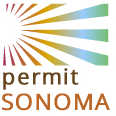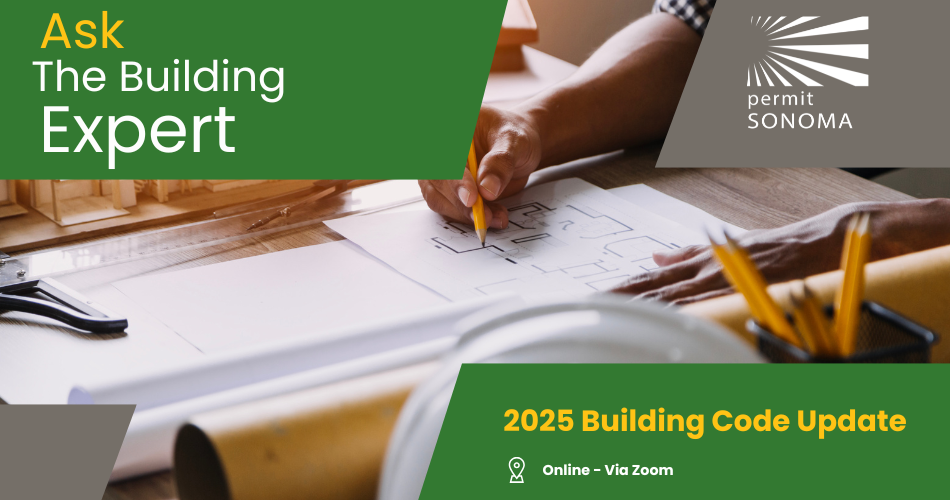
Building Division
The Building Division inspects construction projects after the building permit has been issued. They review projects inside and out to make sure they are built according to the approved plans and building codes. The focus of this division is on protecting public health and safety.
Upcoming Events | Ask the Building Expert
California Building Code Update
The new California Building Code update cycle is here! These new codes will be effective January 1, 2026.
The State of California operates on a triennial (three-year) code adoption cycle. The current 2022 California Building Standards Code will be superseded by the new 2025 California Building Standards Code (California Code of Regulations, Title 24)
Submittal Deadlines and Transition Policy
The governing code for a project is determined by the date a complete permit application is submitted to our department. This is a critical deadline for all pending and future projects.
Applications Submitted BEFORE January 1, 2026:
Permit applications for new construction, additions, or alterations that are formally submitted and accepted as complete by our office on or before December 31, 2025, will be reviewed and inspected under the 2022 California Building Standards Code.
Applications Submitted ON OR AFTER January 1, 2026:
All permit applications submitted on or after January 1, 2026, must be designed and demonstrate full compliance with the 2025 California Building Standards Code. There will be no exceptions.
The code in effect at the time a permit application is submitted is the code that applies to that project throughout its duration.
We're here to help!
Building Inspections
Inspection scheduling, cancellation, time estimates, and results.
- Email: PermitSonoma-BuildingInspection@sonomacounty.gov
- Phone: (707) 565-1900 (Option 3)
- Inspection Scheduling
Building Plan Check
Reviews construction plans prior to permit issuance to ensure compliance with building, electrical, plumbing, and mechanical codes and sound engineering practices.
- Email: PermitSonoma-PlanCheck@sonomacounty.gov
- Phone: (707) 565-2095
- Fax: (707) 565-2210
- Building Plan Check Response Times
Learn More
We encourage all applicants to review project timelines in light of upcoming Building Code changes. Ensure your architect, engineer, or designer is aware of the new regulations and effective dates, and that plans are prepared for the correct code cycle based on your intended submittal date.
Plan Ahead
If you intend to submit under the 2022 codes, allow ample time to prepare a complete application package before the December 31, 2025 deadline. Incomplete submittals will not be accepted.
Prepare for New Standards: Projects submitted in 2026 must meet the requirements of the 2025 codes.
CA Building Code Update | Highlights
2025 California Building Code (Title 24, Part 2)
- Enhanced wildfire safety: Following the creation of the Wildland-Urban Interface (WUI) code, California is adopting stricter fire-resistance standards for buildings in high-risk zones, including requiring fire-rated, ember-resistant vents.
- Mass timber expansion: The use of mass timber as a sustainable structural option is expanded, allowing for taller wood buildings (up to 18 stories for certain types) with new detailing and connection requirements.
- Updated seismic design: New seismic provisions incorporate the latest USGS data, potentially increasing design forces in high-risk areas and adding stricter requirements for structures near active faults.
- Updated structural loads: Adjusted requirements for snow and wind loads reflect updated maps and trends, affecting building design, especially for canopies and solar panels.
- Accessibility for EV charging: New provisions clarify that accessible electric vehicle charging spaces are required, with specific standards for signage and space.
- Balcony and Elevated Exterior Element Safety: In response to events like the Berkeley balcony collapse, the 2025 code incorporates stricter requirements for the design, materials, and waterproofing of balconies and other elevated exterior elements. This includes enhanced load-bearing standards and more robust inspection mandates during construction.
2025 Energy Code (Title 24, Part 6)
- Heat Pumps for Space and Water Heating: For newly constructed residential buildings, the prescriptive compliance path now mandates all-electric heat pump systems for space and water heating. While gas furnaces can still be used, they require compliance through the more complex performance method. This effectively phases out the standard installation of gas furnaces and water heaters in new homes.
- Electric-Ready Infrastructure: New buildings must be pre-wired for future electric appliances, including commercial kitchens, to encourage later upgrades to cleaner technologies.
- Stricter Ventilation Standards: Indoor air quality is improved with stronger ventilation requirements for multifamily buildings.
- Updated solar and battery rules: Requirements for solar photovoltaic and battery storage systems are updated for high-rise multifamily and nonresidential buildings.
2025 Green Building Standards Code (Title 24, Part 11)
- New energy metric: The framework for assessing energy performance shifts from Time Dependent Valuation (TDV) to the more comprehensive Long-Term System Cost (LSC), which incorporates life-cycle costs and greenhouse gas emissions.
- Mandatory EV chargers: The code replaces the previous "EV-Capable" standard with more stringent mandates for installing actual Level 2 EV chargers and receptacle outlets in residential buildings.
- Construction waste management: All projects must now have a formal construction waste management plan that includes a 65% diversion requirement.
- Embodied Carbon Limits: For the first time, CALGreen will introduce requirements to measure and reduce the embodied carbon of building materials. This will apply to new non-residential buildings larger than 100,000 square feet and will focus on key structural materials like concrete and steel. This change will require new documentation (like Environmental Product Declarations) and design strategies.
Building Regulations
- Sonoma County Building Regulations
Chapter 7, Article II of Sonoma County's Municipal Code outlines building regulations for the unincorporated area of this county. This includes regulations for construction, maintenance, use and occupancy as required to provide the minimum standards to safeguard the life, limb and property and protect the public health, safety and general welfare. - California Building Code
Every three years, the State adopts new codes to establish uniform standards for the construction and maintenance of buildings. The California Building Standards Code is the basis for the design and construction of buildings in California. - Building and Fire Code Updates - Effective January 1, 2023
Permit applications received on or after January 1, 2023 must meet the new codes. (Permit applications received before December 31, 2022 do not need to meet the new codes, and will instead be reviewed and permitted according to the 2019 codes.) - View Latest Technical Bulletins for the New Codes
- Water Efficient Landscape Ordinance
Notice to Applicants for Commercial Building Permits
Under federal and state law, compliance with disability access laws is a serious and significant responsibility that applies to all California building owners and tenants with buildings open to the public.
Disability Access Requirements and Resources (PDF: 115 kB)
Building Permit
Most construction, from new construction to alternations and repairs, requires a building permit. There are two types of building permits:
-
Building with No Plan Check
For simpler projects that do not require building plans. (May still require a site plan.) -
Building with Plan Check
For projects that require building plans.
But in some cases, a building permit is not required:
No Building Permit Required
Simple projects that do not require a building permit. Building codes must still be followed and other permits might still apply (e.g. Well & Septic, Use, or Zoning).
More Information: When Is a Building Permit Not Required? – BPC-005
Revisions
If a construction project is revised, for example by altering floor plans or adding additional square footage, the revisions must be reviewed and approved by Permit Sonoma prior to making those changes in the field.
Expedited Permitting Process
Certain projects receive expedited permit processing.
- Post-Fire Rebuilding
- Environmental
Inspections
Under the Building Code, all construction or work that requires a building permit shall be subject to inspection and approval by the County Building Inspector.
- Inspections: Information on the Inspection process.
- Inspection Scheduling: Schedule and find out the results of your building inspections in one of 3 ways.
- Building Inspection Codes: Find the 3 digit codes needed to schedule inspections.
Resources
Building Division Fee Schedule
Fees associated with building permits including Building Inspection, Building Plan Check, and Fire Inspection.
Building Permit with Plan Check to Permit Issuance
View how long it took from application submission, to first review comments, to permit issuance during the previous month.
Lead Hazard Warnings on Pre-1978 Buildings
Permit Sonoma issues over-the-counter permits for work on existing pre-1978 buildings that may contain lead hazards. There are several resources about lead poisoning and prevention.
Instructions & Forms
- Building Inspection
- Building & Grading Plan Check
- CALGreen/Green Building
- Solar Residential Rooftop Systems
Policies and Procedures
USGS Geologic Hazards - Spectral Response Acceleration Maps
- USGS Geologic Hazards – Spectral Response Acceleration Anchor Bolts Map
- USGS Geologic Hazards – Spectral Response Acceleration Wall Bracing Map
The map represents the USGS contour intervals of spectral response acceleration and determines the required amount of wall bracing for structures within specified geographical areas within Sonoma County.
Green Building
- CALGreen/Green Building
California's green building standards code. View checklists and find certified inspectors. - EPA Certified Wood Stoves
- Water Efficient Landscape Ordinance
- Wood Burning Handbook – California Air Resources Board
Construction Documents
- Technical Bulletins
Information from the Building Division to help you with your project covering accessibility, building, electrical, mechanical, and plumbing.
Sonoma County prepares for California Building Code updates
Permit Sonoma’s Building Division is preparing for the upcoming changes to the California Building Standards Code, which take effect on January 1, 2026. The 2025 code cycle introduces new statewide requirements that focus on wildfire resilience, clean energy and sustainable construction practices.


 Translate
Translate